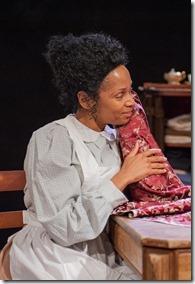
Intimate Apparel
Written by Lynn Nottage
Directed by Steve Scott
at Athenaeum Theatre, 2936 N. Southport (map)
thru Aug 24 | tickets: $20-$28 | more info
Check for half-price tickets
Read review
A moving story of romance, oppression and empowerment
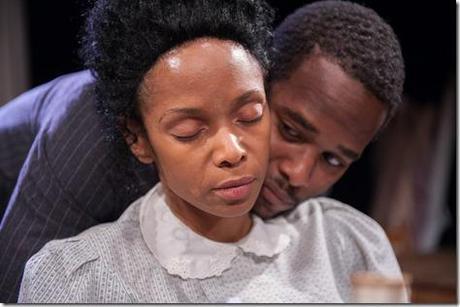
Eclipse Theatre presents
Intimate Apparel
Review by Catey Sullivan
As richly detailed as the exquisite silk corsets that figure prominently in the plot, Eclipse Theatre’s Intimate Apparel is an intricate story of romance, oppression and empowerment in fin de siècle New York City. Directed by Steve Scott, Lynn Nottage’s look into the life of an African-American seamstress spins an absorbing tale literally and metaphorically grounded in the titular luxurious underthings.
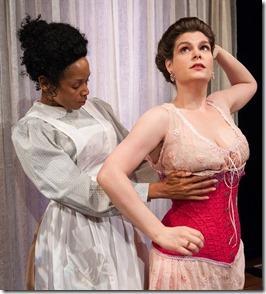
The seamstress is one of millions of African Americans who came north during the first half of the 20th century, a representative of the massive Great Migration. Her father was a slave too broken to thrive as a free man, her mother died of influenza, Esther explains. As a young woman, she left North Carolina, hoping to make her way in the North. Through those biographical scraps, Nottage provides a microcosm of a migratory movement that shaped the course of history. Intimate Apparel emphasizes Esther’s universal yet specific story with two, black and white photographs that shimmer over the stage at key points in the story. “Unidentified Negro Seamstress” is both particular in its details and emblematic of thousands of young black woman. To describe the other image would result in a major spoiler, so suffice to say it’s similarly evocative.
Nottage also opens a window on the rigid class system in place and to the historical context surrounding Esther. Socialite Evangeline Van Buren (Skye Shrum), and prostitute Mayme (Ebony Joy) both revel in the seductive powers of Esther’s creations. For Esther, long resigned to a life without a love of her own, romance arrives unexpectedly in a letter from Panama. George Armstrong (Brandon Greenhouse), one of the thousands of African American men whose sweat and blood built the Panama Canal (“a great fissure that reaches right into the earth’s belly”), has heard of Esther from a fellow worker who once went to church with her. A long-distance courtship ensues, with Esther cautiously allowing herself to believe that just maybe she won’t be going through life alone after all.
From here, Nottage unfurls the complicated, often sorrowful “after” that always follows “happily ever after.”
As Intimate Apparel unspools, Nottage reveals the two-way deception that’s defined the exchange of letters and wrenchingly details Esther’s harsh descent into shame, desperation and disillusionment as it becomes clear that George is not the upstanding, poetic gentleman of his letters.
Scott’s ensemble is strong throughout. Greenhouse depicts a man who is at once despicable and impossible not to empathize with. In his descriptions of the work in Panama – a sweltering, mud-encrusted hell-on-earth where one young black man died for every 20 feet of canal built –you can practically feel the thick humidity and the smell of kerosene hanging the air. Upon his arrival in New York, George finds only bitterness in the land of his dreams. “At least in Panama a man know here he stand. He chattel, he know he chattel,” George says, and in Greenhouse’s delivery, the proclamation stabs like a knife.
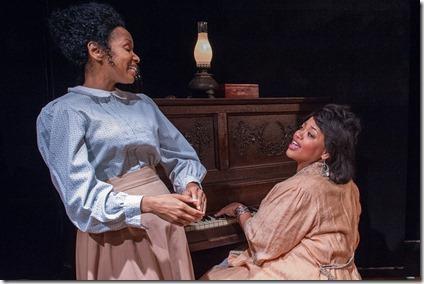
Esther’s disappointments are equally acute. Joy melts away, leaving desperation, confusion and sad wisdom in their wake. Owens travels a mountainous emotional spectrum, and she does so with dignity, authenticity and a quiet, steadfast heroism that ensures you’ll never think of Esther as a victim, even when she loses everything.
The supporting players all turn in equally excellent performances. As a society wife who has failed at her sole purpose in life – to bear children – and been summarily dismissed by her husband, Shrum captures the institutional sexism and racism of the time, seeming genuinely surprised and baffled that Esther doesn’t consider her a friend (“How we friends when I ain’t never been through your front door?”). Her giggled response to Esther’s query about whether she and her husband are in love reveals volumes: “I am married Esther. Such a romantic question,” Mrs. Van Buren says, and it’s clear that she thinks Esther is ridiculous for conflating marriage with love.
As Mayme, Joy gradually reveals the tenderness and pain under Mayme’s hardened exterior. A talented musician, Mayme should be earning her keep as a pianist. Instead, she survives by selling her body, and endured beatings as a child for wasting her time at the keyboard.
Eustace Allen is simply wonderful as a Jewish cloth seller whose religion prohibits him from pursuing the ardor he feels for Esther. There’s a beautiful moment when he recoils from Esther’s touch, and she bristles with a sharp comment about how color isn’t contagious. Mr. Marks is quick to explain that his faith bars him from touching any woman who he isn’t related to. “It is Rabbinical Law, not mine,” he says, and there’s a world of sadness, warmth and longing in his voice. And as boarding house proprietor Mrs. Dickson, Frances Wilkerson shines with an aura of maternal wisdom.
Costume designer Rachel Lambert does an exquisite job crafting the underthings that mold the women into feminine ideal, intricate workings of lace and silk carefully cloaking the cage-like underpinnings that sometimes squeeze the very breath out of the women who wear them. The titular corsets, smoking jackets and chemises of Nottage’s work are wearable art, each garment revealing key elements of the characters who wear them. The care and detail so clearly taken in crafting them also reflects the aesthetic of the entire production. Intimate Apparel is a moving, compelling, richly told story packed with historical import and contemporary relevance.
Rating: ★★★½
Intimate Apparel continues through August 24th at Athenaeum Theatre, 2936 N. Southport (map), with performances Thursdays-Saturdays at 7:30pm, Sundays 2pm. Tickets are $20-$28, and are available by phone (773-935-8675) or online through OvationTix.com (check for half-price tickets at Goldstar.com). More information at EclipseTheatre.com. (Running time: 2 hours 45 minutes, includes an intermission)
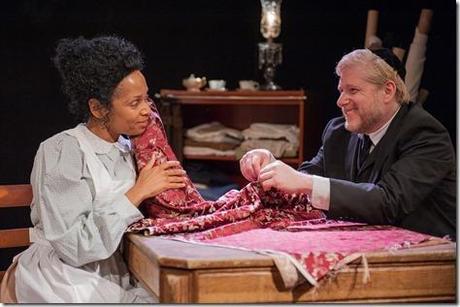
Photos by Tim Knight
artists
cast
Kelly Owens (Esther Mills), Frances Wilkerson (Mrs. Dickson), Eustace Allen (Mr. Marks), Skye Shrum (Evangeline Van Buren), Ebony Joy (Mayme) Brandon Greenhouse (George Armstrong), Patrice Foster (Ester Mills, understudy).
behind the scenes
Steve Scott, (director), Noelle Monroe (assistant director), Rebecca Ross (stage manager), Kevin Hagan (scenic designer), Christopher Kriz (original music, sound design), Rachel Lambert (costume design), Breena Cope (assistant costume design), Chelle Fenwick-Smith (assistant stage manager), Sarah Moeller (dramaturg), Christine Adaire (dialect coach), Nathaniel Swift (artistic director, producer), Kevin Scott (managing director, co-founder), Tim Knight (photos)
14-0728

